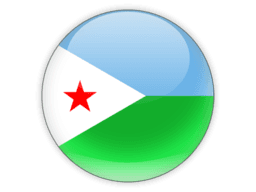
Regions of Djibouti
Explore 6 regions
Cities of Djibouti
Discover 8 cities across 6 regions
Ali Sabieh(1)
Arta(1)
Djibouti(2)
Obock(1)
Tadjourah(1)
Djibouti is a small country located in the Horn of Africa, bordered by Eritrea to the north, Ethiopia to the west and south, and Somalia to the southeast. The country has a population of approximately one million people, and its capital and largest city is Djibouti City.
Djibouti is known for its strategic location at the southern entrance to the Red Sea, making it a key transit point for international trade and shipping. The country is also home to the only permanent US military base in Africa, as well as bases for French and Japanese forces.
The economy of Djibouti is largely dependent on its port and logistics industry, which accounts for approximately 80% of the country's GDP. The country also has a small but growing tourism industry, thanks to its beautiful natural landscapes and unique cultural heritage.
Djibouti is a multi-ethnic country with a diverse population that includes Somali, Afar, and Arabic-speaking communities. The official languages are French and Arabic, although Somali and Afar are also widely spoken.
Djibouti has a hot and arid climate, with very little rainfall and high temperatures throughout the year. Despite its challenging environmental conditions, the country has made significant progress in improving access to education and healthcare, as well as reducing poverty and improving living standards.
However, Djibouti continues to face challenges related to political instability, corruption, and human rights abuses. The government has been criticized for limiting freedom of expression and press freedom, as well as for mistreatment of refugees and migrants.
Overall, Djibouti is a unique and fascinating country with a strategic location, diverse population, and challenging environmental conditions. While it faces a number of challenges, it has made progress in improving access to essential services and reducing poverty.
Telephone Code
253
Local Emergency Phone
Ambulance: 351351; Fire: 18; Police: 17
Vaccinations
An International Certificate of Vaccination for yellow fever is required for travelers arriving from countries with a risk of yellow fever transmission and for travelers having transited through the airport of a country with risk of yellow fever transmission. See WHO recommendations. On 21 March 2022, the US Centers for Disease Control and Prevention (CDC) issued a Travel Alert for polio in Africa; Djibouti is currently considered a high risk to travelers for polio; the CDC recommends that before any international travel, anyone unvaccinated, incompletely vaccinated, or with an unknown polio vaccination status should complete the routine polio vaccine series; before travel to any high-risk destination, CDC recommends that adults who previously completed the full, routine polio vaccine series receive a single, lifetime booster dose of polio vaccine.
Climate
Desert; torrid, dry
Currency (Code)
Djiboutian francs (DJF)
Electricity/Voltage/Plug Type(s)
220 V / 50 Hz / plug types(s): C, E
Major Languages
French, Arabic, Somali, Afar
Major Religions
Muslim 94%, Christian 6% (mainly foreign born residents)
Potable Water
Opt for bottled water
International Driving Permit
Suggested
Road Driving Side
Right
Tourist Destinations
Djibouti City; Lake Assal; Tadjoura; Ali Sabieh; Gulf of Tadjoura; Goba’ad Plain
Major Sports
Cricket, soccer
Cultural Practices
Unlike many western countries, the average work week in the country runs from Saturday to Thursday, 8 a.m. to 2 p.m. Many private companies reopen in the afternoon from 4 to 7 p.m.
Tipping Guidelines
Tipping is customary in Djibouti, with tips in restaurants being about 10%.
Souvenirs
Malachite and amber beaded items, hammered silver jewelry, traditional African clothing and woven goods, tribal art and daggers, wooden and carved stone items, scented incense, coffee beans
Traditional Cuisine
Skoudekharis — a one-pot dish of rice and spices that includes generous portions of lamb
Geography
Area
total: 23,200 sq km
land: 23,180 sq km
water: 20 sq km
Climate
desert; torrid, dry
Natural resources
potential geothermal power, gold, clay, granite, limestone, marble, salt, diatomite, gypsum, pumice, petroleum
People and Society
Population
976,143 (2023 est.)
Ethnic groups
Somali 60%, Afar 35%, other 5% (mostly Yemeni Arab, also French, Ethiopian, and Italian)
Languages
French (official), Arabic (official), Somali, Afar
Religions
Sunni Muslim 94% (nearly all Djiboutians), other 6% (mainly foreign-born residents - Shia Muslim, Christian, Hindu, Jewish, Baha'i, and atheist)
Population growth rate
1.93% (2023 est.)
Government
Government type
presidential republic
Capital
name: Djibouti
Economy
Economic overview
food import-dependent Horn of Africa economy driven by various national military bases and port-based trade; fairly resilient from COVID-19 disruptions; major re-exporter; increasing Ethiopian and Chinese trade relations; investing in infrastructure
Real GDP (purchasing power parity)
$5.432 billion (2021 est.)
Real GDP per capita
$4,900 (2021 est.)
Agricultural products
vegetables, milk, beef, camel milk, lemons, limes, goat meat, mutton, beans, tomatoes
Industries
construction, agricultural processing, shipping
Exports
$5.16 billion (2021 est.)
Exports - partners
Saudi Arabia 42%, India 15%, China 14%, Egypt 5%, South Korea 5% (2019)
Exports - commodities
various animals, chlorides, dried legumes, industrial fatty acids/oils, coffee, chickpeas (2019)
Imports
$5.483 billion (2021 est.)
Imports - partners
China 43%, United Arab Emirates 15%, India 7%, Turkey 5% (2019)
Imports - commodities
refined petroleum, fertilizers, iron sheeting, cars, palm oil (2019)
International Airports in Djibouti
Discover 1 major airports serving Djibouti
Mark Djibouti as Visited
Add Djibouti to your personal travel map and track your journey around the world. Share your adventures and see your progress grow!